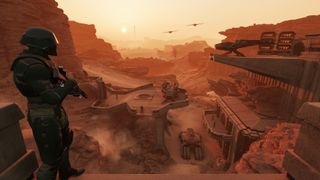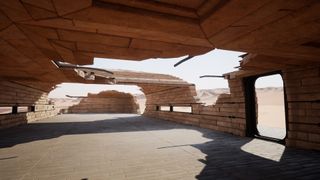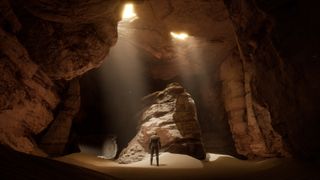Spice, worms, and water: First details on survival systems in the upcoming Dune MMO
Dune: Awakening will focus on a "few tight core survival mechanics" like shelter, traversal, and water, says creative director Joel Bylos.

Survival games can be a grind—just ask anyone who's ever tried to craft a splint for a broken leg while baking in the sun, dying of hunger, and suffering from intestinal parasites. Not that survival fans don't love finding themselves in those kind of situations, but the trials of hardcore survival games aren't for everyone, and some recent games in the genre, like Valheim, have made those systems more appealing for players who don't want to spend all their time managing hunger meters and curing themselves of diseases.
Last week I spoke to Joel Bylos, creative director for upcoming open world survival MMO Dune: Awakening. We first saw the cinematic trailer last year, giving us a quick glimpse of Funcom's MMO based on the Dune novels by Frank Herbert and the 2021 film (and planned 2023 sequel), which is set on a "vast and seamless Arrakis" that will be shared by "thousands of players."
I'm not a big MMO player, but I've played plenty of survival games so I was curious just how deep and intricate Dune: Awakening's survival systems are. We already know from the books and films that staying alive on the desert planet of Arrakis is extremely challenging, considering the deadly heat, the fact that everyone has to wear a "stillsuit" to recycle their body's moisture, and of course, those darn sandworms popping out of the ground to devour anyone who takes a false step on the sand.
"We're very focused on a few tight core survival mechanics. Like shelter: sandstorm shelter," Bylos said. "Sandworms themselves are a giant threat in the world. If you walk on sand, they will come. If you create vibrations, they will come. So you have to think about how you approach traversal in the game world. And obviously, water. Those are our three key [systems]."
Spice is power
Those aren't the only threats in the world of Dune. There are hazards like quicksand, and the extreme temperatures of the desert, that Funcom wants players to have to consider and prepare for, but not be overly punished by.
"We want players to feel these tensions all the time," Bylos said. "We want them to be continually thinking about, if I'm going across the open sand, I have to think about the sandworms. If there's a sand storm coming, I have to know where there's shelter nearby. If I haven't built something I need to know where I can hide where I can get away from the sandstorms. So we're trying to create this tension. But we're also approaching it from the viewpoint of a little more accessibility, something like Valheim, where it's not like just gonna kill you instantly. So you have a little bit of leeway."


Valheim successfully did a few things, as Fraser put it, to reject boring survival systems and make them more appealing for players who don't typically play survival games. Food, for instance: you'll never starve to death from not eating. While food remains a deeply important part of Valheim for maintaining your health and stamina, you can get by while neglecting it. That's the sort of idea Funcom is going for with its own survival systems in Dune: Awakening.
PC Gamer Newsletter
Sign up to get the best content of the week, and great gaming deals, as picked by the editors.
"We're not trying to punish the player by killing them if they have don't take spice for a while, but we're trying to give them good reasons to maintain their spice levels."
Joel Bylos, Creative Director
"There are assumptions that have just been there since the start of the survival genre, because the first [survival] game did them," Bylos said. "And everybody else sort of copied that, so we're rethinking some of those paradigms. And so I would say that we want to create these very strong survival tensions, but we also don't want to punish players in a ridiculously harsh way. So we're we're kind of trying to find a nice balance with that."
While water is the key to life on Arrakis, Bylos said, "Spice is power." At the start of the game, players have no strong affiliation to spice but over time it will begin to permeate their bloodstream, which will allow them to enhance their abilities and learn new skills. In some ways, spice sounds like Valheim's food system: something important to the game but not deadly if neglected.
"So you want to stay above a certain [spice] level to keep learning abilities, you might want to stay above a certain level to make sure that you have 100% of your maximum health all the time," Bylos said. "We're not trying to punish the player by killing them if they have don't take spice for a while, but we're trying to give them good reasons to maintain their spice levels."
Sand crafts

Crafting is another big part the survival genre, and Bylos explained how crafting will vary from how it works in another Funcom multiplayer survival game, Conan Exiles.
"In Conan Exiles, you had a tech tree and as you leveled up your character, you spend points in the tech tree. And that's kind of the traditional arc and Conan style of things," Bylos said. "In Dune: Awakening, you're actually going out looking for specific schematics that you can use to craft specific items."
For example, if you have information that a botanical testing station somewhere in the desert was experimenting with a certain kind of technology, you'll head out there to find the schematic, Bylos explained. "So the crafting is a little more bespoke, a little less [tech] tree driven and a little more exploration driven."
Spice harvesting is obviously going to play a major part in the player-driven economy, but crafting will be a path to player success, too. The dangerous sandstorms of Arrakis aren't just a threat to players, but an opportunity.

"There's a pillar of the game we call 'infinite exploration.' And the idea is that outside of the shield wall, the sands actually shift during these Coriolis storms, and the entire map outside of that space changes," Bylos said. As the storm buries existing locations, like testing stations or crashed spaceships, it will also reveal new ones. If you're the first player to visit one of these new locations, you might be the first to find a schematic no one else has found yet.
"And it's a schematic for a type of gun that nobody knows how to make," Bylos said. "So you take it back, and you're the person who has that schematic. And then you can craft those guns and sell them on the exchange, and you're the only one who can craft them until the next time somebody finds that schematic. But that not might not be for the next [storm] cycle."
There's still no announced release date for Dune: Awakening, but the second chapter of the new Dune film series is due out this year, and we wouldn't be surprised if the MMO released at around the same time as the movie. In the meantime, you can sign up for beta access at the official website.


Chris started playing PC games in the 1980s, started writing about them in the early 2000s, and (finally) started getting paid to write about them in the late 2000s. Following a few years as a regular freelancer, PC Gamer hired him in 2014, probably so he'd stop emailing them asking for more work. Chris has a love-hate relationship with survival games and an unhealthy fascination with the inner lives of NPCs. He's also a fan of offbeat simulation games, mods, and ignoring storylines in RPGs so he can make up his own.
Most Popular


